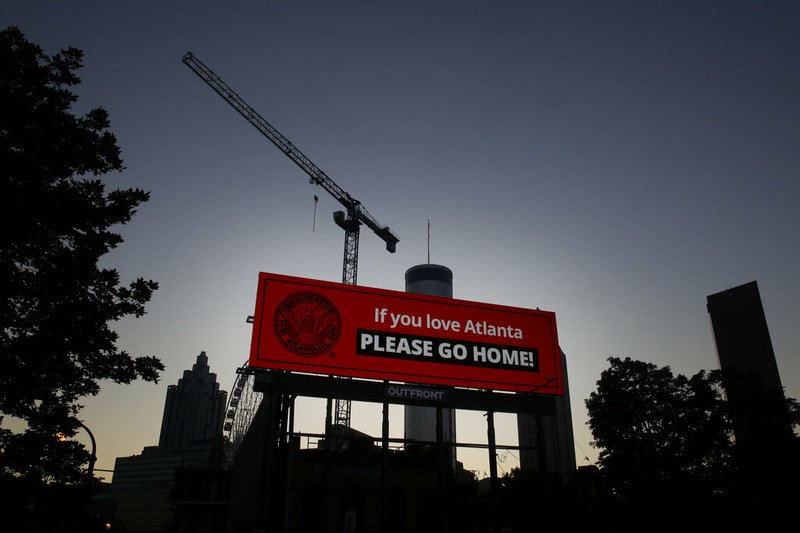ATLANTA — Atlanta’s mayor announced a curfew Saturday night, and Georgia’s governor authorized up to 1,500 National Guard troops to deploy throughout the city after a Friday night protest over the death in Minnesota of George Floyd turned violent.
Atlanta Mayor Keisha Lance Bottoms urged unity and nonviolence during a news conference Saturday evening. She said the curfew will be in effect from 9 p.m. Saturday to sunrise on Sunday, calling it a “very unusual and extreme step.”
Bottoms, who made a passionate and personal plea to protesters the night before, said in a statement issued Saturday that a peaceful demonstration turned into “mayhem and unnecessary destruction” that further strained businesses already struggling to recover from the coronavirus pandemic.
“We know our citizens are angry. We are angry and we want justice,” Bottoms said. “If we are to enact change in this nation, I implore everyone to channel their anger and sorrow into something more meaningful and effective through non-violent activism.”
Officials were also bracing for the possibility of new outbreaks of violence.
Georgia Gov. Brian Kemp, who said he acted at Bottoms’ request, declared a state of emergency late Friday and tweeted that up to 500 members of the National Guard would deploy immediately “to protect people & property in Atlanta.” In a tweet Saturday afternoon, Kemp said he had signed an order authorizing as many as 1,500 National Guard troops “to deploy throughout the city to maintain order and address hotspots of illegal activity.”
Lt. Stephanie Stallings with the state Department of Public Safety declined to give specifics but said in an email that the agency “is prepared for any potential issues that could arise in Atlanta tonight.”
National Guard members lined sidewalks in downtown Atlanta Saturday morning, blocking anyone from approaching heavily damaged buildings, including the College Football Hall of Fame and nearby restaurants. Shattered glass littered the sidewalk and spray-painted graffiti was plentiful.
Street cleaning crews and volunteers cleaned up debris as curious residents surveyed the aftermath, taking photos and shooting video. Graffiti on the big logo outside the CNN Center in downtown Atlanta had already vanished.
As protesters set fires and broke windows Friday night, officers issued disbursement orders and used tear gas to try to stop them, according to Atlanta police. Protesters shot at officers and threw bricks, bottles, rocks and knives, police said.
At least three officers suffered minor injuries, 20 police cars were damaged and 71 arrests were made, police spokesman Carlos Campos said in an email Saturday.
On Saturday morning, damage to businesses and some apartment buildings could be seen along sections of Peachtree Road in Buckhead, an upscale neighborhood north of downtown Atlanta where large groups moved late Friday night after demonstrations downtown splintered.
Windows were shattered at a CVS pharmacy and a Dick’s Sporting Goods store across the street from Phipps Plaza, a luxury shopping mall where plywood boards were nailed over entrances and a disaster recovery team worked.
Just up the road there was visible damage to Del Frisco’s Grille, where the Atlanta Fire Rescue Department said firefighters extinguished a blaze.
Several high-end jewelry stores up and down Peachtree sustained damage, with smashed windows and storefronts boarded. The front door of a Dior designer clothing store was broken and displays inside toppled.
The demonstration Friday began peacefully, according to both police and participants. It began with a rally at Centennial Olympic Park downtown, followed by a march to the state Capitol and then a return to the park, where they listened to speakers and said a prayer, said attorney Gerald Griggs, a leader in the local NAACP.
That peaceful protest wrapped up around 6:30 p.m. A splinter group of outsiders confronted police and became violent and destructive, Griggs said. That violence then continued into the early hours of Saturday.
Elsewhere in Georgia, the mayor of Savannah held a news conference Saturday ahead of plans circulating online for a protest Sunday. Mayor Van Johnson said he plans to join the march through the heart of the city’s prized historic district, but warned that violence would not be tolerated.
Johnson said he understood how the deaths of Floyd in Minneapolis and Ahmaud Arbery in nearby Brunswick had sparked outrage across the U.S. — anger that he said has been amplified by the coronavirus pandemic in which people have seen family members die and lost jobs while being cooped up at home.
Information for this article was contributed by Ben Nadler of The Associated Press.
